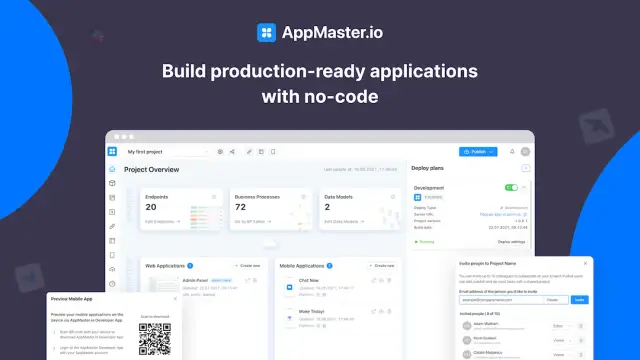Why PWAs Are the Future of Web Development: A Complete Guide
Progressive Web Apps (PWAs) blend the best of web and mobile apps. Discover why they're the future of web development, offering speed, adaptability, and user engagement.

An Overview of Progressive Web Apps
Progressive Web Apps (PWAs) have emerged as a pioneering technology that bridges the gap between conventional web pages and mobile applications. By leveraging modern web capabilities, PWAs offer a user experience akin to native apps while retaining the full power and accessibility of the web, thus providing the best of both worlds.
At the core, PWAs are designed to be reliable, fast, and engaging. They employ service workers, manifests, and other resources to extend traditional web applications' capabilities, enabling offline usage, push notifications, and compatibility with various devices and platforms. These versatile applications are crafted using standard web technologies such as HTML, CSS, and JavaScript, ensuring they run seamlessly across diverse internet browsers without the need for separate mobile applications.
PWAs are built to adapt progressively, enhancing their functionality as browser capabilities expand. This adaptability is key to their effectiveness; as browsers and user devices adopt new technologies, PWAs automatically enhance their performance and features without the necessity for constant updates by developers. This progression is achieved by smartly detecting the environment and providing the best possible experience without alienating any segment of the user base.
Another significant aspect of PWAs is their capabilities to perform offline or with intermittent internet connectivity, ensuring users have a seamless experience regardless of their network status. This functionality becomes possible with the use of service workers, which cache essential resources and manage network requests intelligently to provide the immediate availability of content.
Installing a PWA on a device is as straightforward as bookmarking a webpage but provides users with an app-like experience, complete with an icon on the home screen. This ease of installation eliminates the barriers associated with app store submissions, downloading, and updates, making them a practical choice for businesses aiming to bolster user engagement without extensive app development resources.
PWAs also align with the evolving digital security landscape. Hosting PWAs over HTTPS ensures data confidentiality and integrity between user devices and servers, establishing trust and safeguarding sensitive information against potential threats. Therefore, progressive enhancement of web applications via PWAs goes hand-in-hand with streamlined security practices.
Incorporating PWAs into the development framework signifies an embrace of modern, agile methodologies that prioritize user experience, scalability, and cost-efficiency. Tools like AppMaster further facilitate this initiative by providing platforms to build, customize, and deploy PWAs with minimal effort while ensuring maximum effectiveness. By enabling swift development cycles and maintaining quality across web application lifecycles, such platforms reinforce the growing dependence on PWAs as a forward-thinking solution in a competitive digital sphere.
Key Benefits of PWAs
Progressive Web Apps (PWAs) have become an influential force in web development due to their unique ability to merge the best aspects of web and mobile applications. In this section, we delve into the key benefits that make PWAs a compelling choice for both developers and end-users.
Seamless User Experience
PWAs offer a seamless user experience that parallels native mobile applications. They provide smooth, engaging interfaces with the interactive capabilities that users have come to expect from traditional mobile apps. Through efficient caching strategies and service workers, PWAs are able to load nearly instantly, ensuring minimal delay for users accessing them from any network condition. This level of performance offers an excellent user experience resulting in increased engagement and user retention.

Offline Functionality
One of PWAs' defining features is their ability to function offline or in areas with poor connectivity. By utilizing service workers, a core component of PWAs, these applications can cache essential resources and user interactions, allowing them to perform operations even without an internet connection. This innovative feature enables users to continue their tasks uninterrupted, thereby improving accessibility and usability, particularly for regions with unreliable network availability.
Push Notifications
Effective user engagement is pivotal for the success of an application, and PWAs excel in this by utilizing push notifications. Through real-time updates and timely reminders, PWAs can keep users engaged, encouraging frequent visits and interaction with the application. This capability not only helps in retaining users but also makes it easier to deliver critical information directly to their devices, enhancing communication between users and the brand behind the PWA.
Cost-Effectiveness
Adopting PWAs can be a cost-effective strategy as they allow developers to build a single app that works smoothly across multiple platforms and devices. This reduces the need for separate development teams for iOS, Android, and the web, which significantly lowers development and maintenance costs. With a single codebase, streamlined updates and management become possible, saving time and resources in the long run.
Easy Installation
Unlike traditional apps that demand users to navigate app stores for installation, PWAs can be effortlessly added to a device's home screen directly from the browser. This simplified installation process does not require any extra effort from the user, leading to higher conversion rates and increased app adoption.
Enhanced Security
Security is increasingly critical in web applications. PWAs prioritize user safety by being served over secure HTTPS connections, ensuring that data exchange between the client and server is encrypted and protected against potential threats. This focus on security not only builds user trust but also aligns with modern web standards, making PWAs a reliable choice for businesses and users alike.
Improved Performance
The underlying technologies powering PWAs, like service workers and cache APIs, allow these applications to load rapidly, providing swift performance akin to native apps. With AppMaster's approach, applications can be generated with optimized code, further improving their efficiency and enhancing the overall performance of the web apps, even under high load scenarios.
In summary, PWAs provide a bridge between web and mobile applications, offering numerous benefits like improved performance, user engagement, and cost-effectiveness. Platforms like AppMaster, known for generating scalable applications, further ease the development process, making it feasible to harness the power of PWAs for various business needs.
How PWAs Enhance User Experience
Progressive Web Apps (PWAs) are revolutionizing how users interact with web content by offering a seamless blend of web and mobile app experiences. This innovation is designed with user engagement at its core, ensuring that individuals enjoy a dynamic, intuitive, and efficient journey while browsing or accessing services via a PWA.
Native-App Feel and Functionality
One of the standout features of PWAs is their ability to provide a native app-like experience directly through the web. By mimicking the elements of a native app — such as smooth animations, swift transitions, and intuitive interfaces — PWAs offer users the comfort and familiarity they typically find in applications downloaded from app stores. This native feel extends to the ability to install PWAs directly onto a device's home screen, thereby integrating deeply into users' daily digital ecosystems.
Offline Functionality
The significant advantage of PWAs is their capability to function offline or in weak network conditions. This is achieved through service workers — scripts that run in the background and facilitate resource caching. This means that users can continue to engage with PWAs even when disconnected, ensuring uninterrupted access to core features and previously accessed content. For businesses, this translates to reduced bounce rates and increased user retention, fostering a more robust relationship with their audience.

Improved Performance
PWAs are engineered to be fast and responsive, loading quickly regardless of network conditions. They achieve this through a combination of intelligent resource caching, streamlined network requests, and optimized code execution. This results in incredibly fast load times and minimal latency, which are critical factors for maintaining user attention and satisfaction.
Push Notifications
Engaging users and keeping them informed without being intrusive is a delicate balance that PWAs master through push notifications. These notifications enable businesses to reach out to their users with updates, offers, and reminders, directly impacting engagement and conversions. When used effectively, push notifications in PWAs can rival those of native apps, offering a powerful channel for ongoing communication and user re-engagement.
Cross-Device Accessibility
Unlike traditional web and mobile apps that may have limitations across different devices and operating systems, PWAs are inherently designed to be platform-agnostic. Users can access PWAs on any device with a standards-compliant web browser, ensuring broad accessibility. This uniformity leads to a consistent user experience, reducing friction and promoting satisfaction, irrespective of the user's device choice.
Security and Trust
PWAs enhance user trust by operating over HTTPS, an essential protocol that ensures secure, encrypted communications between the web service and end users. This security measure is critical in today's digital environment, where data privacy and protection are paramount. For users, knowing that their information is safeguarded encourages continued engagement and positive interactions with the PWA.
By offering functionalities once reserved for native applications and eliminating traditional web app limitations, PWAs represent a pivotal advancement in web development. Organizations leveraging platforms like AppMaster for PWA development can tap into these multiple user experience enhancements, which translate into higher satisfaction and better business outcomes.
Technical Aspects Behind PWAs
Progressive Web Apps (PWAs) have become an essential part of modern web development due to their ability to offer users a seamless app-like experience directly from the browser. To achieve this, PWAs rely heavily on several innovative technologies. Understanding these elements is crucial, as they collectively contribute to the responsiveness, accessibility, and engagement factors that PWAs are known for.
Service Workers
At the heart of every PWA is the service worker— an indispensable tool that performs tasks in the background of a web page, independent of the page’s lifecycle. Essentially a type of web worker, a service worker intercepts network requests, allowing developers to enable offline functionalities, cache assets effectively, and implement mechanisms like background synchronization. Service workers provide the backbone for the intelligent caching process. By programming them to cache specific resources dynamically, developers ensure that a website can load almost instantaneously, regardless of the current network state. This is particularly useful for users with unreliable internet connections.
Web App Manifest
The Web App Manifest is a JSON file that enables PWAs to be installed on a user’s home screen, much like a native application. This manifest file contains metadata about the app, such as its name, icons, theme colors, and key user interface attributes. By defining these elements, the developer ensures that the PWA appears as an integral application within the user’s device ecosystem. The Web App Manifest plays an essential role in the look and feel of the app, ensuring consistency across different platforms and enabling the app to launch in full-screen mode, should the developer choose to enable this feature.
HTTPS Protocol
Security is a major component of PWAs, and running applications over HTTPS is non-negotiable. A key technical requirement, HTTPS ensures that all communications between the PWA and the user's device remain secure and encrypted, protecting the data exchange from man-in-the-middle attacks. By adhering to this protocol, developers reinforce trust with their users, which is especially important in PWAs, where sensitive interactions such as payment processing and personal data entries are handled.
Push Notifications
One of the virtues of PWAs is the ability to send push notifications, which ensure continued user engagement even outside of the application’s active use. This is made possible through a combination of service workers and application programming interface (API) technologies, allowing developers to engage users with timely, pertinent notifications even when a web page is not open. Handling push notifications correctly requires careful consideration of user consent and relevance, as they directly impact user perception and interaction with the app.
Progressive Enhancement
Progressive enhancement is a core principle of PWAs, where basic functionality is provided to all browsers, while more advanced features are available to browsing environments that support them. This method ensures that PWAs are accessible on a variety of devices and browsers, maintaining user accessibility as a primary goal. Developers aim to start with fundamental site functionality, enabling additional enhancements as the end-user’s browser capabilities allow. This ordered approach aligns well with the principles of universal web accessibility.
Networking Efficiency
PWAs are designed to improve network efficiency by optimizing data requests and prioritizing essential resources. Service workers, coupled with caching strategies, make it possible to produce apps that react swiftly to user inputs with minimal latency. Techniques like lazy loading help reduce unnecessary bandwidth consumption by loading images or content only when they are in the viewport, thus enhancing the overall speed and responsiveness of the application.
Integration with AppMaster
The development of PWAs can be significantly streamlined using platforms like AppMaster. AppMaster allows developers to create and deploy web applications rapidly, thanks to its extensive suite of visual tools for assembling data models, business logic, and API endpoints. With AppMaster, the creation of scalable and efficient backends that power a PWA becomes a hassle-free task, speeding up the deployment process and reducing overhead.
PWAs are undoubtedly positioned as revolutionizing the way users interact with web applications, offering a harmonized blend of performance, engagement, and accessibility. By effectively incorporating the described technical aspects, developers are better equipped to harness the potential of PWAs, thereby future-proofing their web solutions.
The Role of AppMaster in PWA Development
As the tech industry embraces Progressive Web Apps (PWAs) for their versatility and cross-platform capabilities, tools such as AppMaster are becoming increasingly relevant. AppMaster is a no-code platform that supports the creation of backend, web, and mobile applications, standing at the forefront of facilitating the seamless development of PWAs with its intuitive features and tools.

Facilitating Efficient Development Processes
AppMaster epitomizes speed and efficiency in application development, making it particularly beneficial for PWAs. The platform’s visual designer allows users to effectively craft data models and business logic without writing a single line of code. This visual representation is pivotal in enabling swift modifications and updates, significant for developing PWAs that require iterative enhancements to cater to dynamic user needs.
By streamlining the development process, AppMaster allows companies to bring products to market faster, enhancing competitive capabilities. The ability to regenerate applications quickly whenever changes are made ensures that PWAs created with AppMaster are always up-to-date and devoid of technical debt, delivering reliable performance to end users.
Comprehensive Tools for PWA Development
AppMaster provides an integrated development environment (IDE) that is equipped with tools necessary for building rich, interactive PWAs. The platform supports features such as offline functionality, a critical component of PWAs, ensuring that users can access applications regardless of connectivity. Furthermore, web apps created on the platform can be made fully interactive with customizable business logic through a Web BP designer, aligning with the app-like feel that PWAs are known for.
The platform’s capability to auto-generate API documentation is another noteworthy benefit, facilitating transparency and ease of maintenance in PWA projects. With every iteration, AppMaster ensures that a comprehensive set of swagger documentation, database schema migration scripts, and other technical necessities are generated, supporting developers in managing the complex architecture of PWAs.
Ensuring Scalability and Security
Scalability and security are paramount considerations in any PWA project. AppMaster addresses these by leveraging its stateless server-side applications generated with Go. The platform ensures that the applications, including PWAs, deliver exceptional performance and scalability, adeptly handling enterprise-level and high-load scenarios.
Additionally, security is maintained through hosting PWAs over HTTPS, ensuring encrypted data exchanges. This compliance with security best practices is critical in building user trust and maintaining application integrity.
Collaborative Approach in PWA Development
One of the unique selling points of AppMaster is its alignment towards collaboration. The platform is designed to be user-friendly, allowing citizen developers to partake in the application development process alongside professional developers. This democratization of app development has implications for PWA projects by broadening the pool of contributors and ensuring diverse input within development teams.
The subscription models offered by AppMaster cater to a wide variety of users, from individuals learning about PWAs to enterprises seeking full-fledged solutions with comprehensive resource allocations and on-premise hosting capabilities. This flexibility ensures that every organization finds a fit that aligns with its needs and scale.
In conclusion, as PWAs gain prominence in the digital ecosystem, AppMaster provides significant advantages with its agile, scalable, and secure framework. By leveraging AppMaster, developers can seamlessly integrate PWA principles into their projects, embarking on a journey towards delivering fast, reliable, and engaging web applications.
Challenges and Considerations for PWAs
While Progressive Web Apps (PWAs) hold immense promise for revolutionizing web development, there are several challenges and considerations that developers must keep in mind to ensure optimal performance and user satisfaction. Understanding these constraints can guide a more thoughtful and effective implementation, further propelling PWAs into widespread use.
Browser Compatibility and Limitations
One of the foremost challenges in developing PWAs is ensuring consistency and compatibility across various browsers. Not all browsers offer full support for every feature that PWAs can provide. While leading browsers like Google Chrome, Mozilla Firefox, and Microsoft Edge have robust support for PWAs, others may exhibit gaps in functionality. Developers must consistently test their PWAs across multiple browsers to identify potential issues and implement fallbacks or custom solutions where necessary.
Handling Offline Functionality
A core advantage of PWAs is their ability to function offline. However, implementing efficient offline functionality is complex and requires careful planning. Developers must decide which resources to cache and set up the Service Worker API correctly to facilitate smooth offline operations. It’s also important to manage versioning and updates of cached data, ensuring that users receive the latest content when reconnected to the internet.
App Discoverability and SEO
Unlike traditional web apps, PWAs exist in a gray area between websites and native apps. This can pose a challenge for app discoverability since they are not housed in app stores, where users often search for new applications. Additionally, standard SEO practices may need to be adapted to ensure PWAs achieve high visibility in search engine results. Developers need to leverage tools like structured data and leverage service worker capabilities to enhance SEO.
Adapting to Diverse Device Hardware
PWAs are designed to work on any device with a standards-compliant browser; however, accessing device-specific features can sometimes be limited due to hardware restrictions. Certain device functionalities, like Bluetooth, biometric scanning, and NFC, may not be fully accessible via PWAs depending on the device and browser combination. Developers should be prepared to develop alternative solutions or limit the use of certain features to maintain cross-device compatibility.
Security Concerns
PWAs run entirely in the browser and must be served over HTTPS to ensure data security. While HTTPS is a basic security feature, guaranteeing comprehensive protection for sensitive data is paramount. Developers should be cautious about managing user data storage and employ encryption and stringent privacy policies to enhance overall safety and trustworthiness. Additionally, regular audits and updates to the service worker scripts can help prevent vulnerabilities.
User Experience and Engagement
Creating an engaging and intuitive user experience in a PWA is critical to its success. The application should mimic the responsiveness of native apps, but achieving this on the web platform can require additional work in terms of animations, transitions, and touch interactions. Optimizing load times and ensuring seamless interactions will enhance user engagement and perceived value of the PWA, encouraging users to save the app to their home screens.
Deployment and Maintenance
Deploying PWAs involves multiple steps to ensure smooth end-user experiences. Service worker registrations, push notifications, and app shell architectures must be managed correctly to enable immediate activation of all functionalities. Maintenance involves tracking performance metrics and bug reporting systems to identify areas needing improvement. A Continuous Integration/Continuous Deployment (CI/CD) approach can greatly simplify keeping the PWA up-to-date and running efficiently.
In conclusion, while Progressive Web Apps represent the future of web application development with their unique blend of efficiency, functionality, and user engagement, careful consideration of the challenges and proactive planning can lead to successful implementation. By addressing these considerations, developers can leverage the full potential of PWAs to create innovative and high-performing applications on the web.
Future Prospects of Progressive Web Apps
Progressive Web Apps (PWAs) are not merely a fleeting trend in the tech industry. They represent a significant shift in how we perceive and utilize web technologies to meet ever-evolving consumer demands. As we look towards the future, the prospects of PWAs within the realm of web development become more compelling.
The Growing Demand for Cross-Platform Solutions
Today's users seek seamless, high-quality experiences across devices. As a result, developers face the continuous challenge of delivering applications that work flawlessly on diverse platforms — be it desktop, mobile, or tablets. Herein lies the strength of PWAs. They boast the ability to straddle across different devices ensuring that users can access core functionalities regardless of the platform being used. This quality makes PWAs a strategic choice for companies aiming for a broader reach without developing separate systems for each operating environment.

Enhancements in Browser Capabilities
One of the primary reasons PWAs are poised for future success is the ongoing advancements in modern browsers. Major browsers are continually integrating capabilities that enhance PWA functionality, thereby making PWAs faster, more reliable, and feature-rich. New APIs are being introduced that allow for more robust offline experiences, better performance, and interactive functionalities, fostering a conducive development environment for PWAs.
PWA Adoption by Industry Leaders
Leading tech companies and renowned enterprises are increasingly adopting PWAs as a central component of their digital strategies. This adoption serves as a testament to the benefits and reliability that PWAs offer. As industry heavyweights embrace PWA technology, it sets a precedent, encouraging more businesses to adopt similar strategies, further solidifying PWAs’ future relevance.
Cost-Effectiveness and Development Efficiency
For organizations, the economic and development efficiencies offered by PWAs are hard to ignore. Unlike native apps that require different versions for various operating systems, PWAs follow a single build strategy. This reduces both development time and costs significantly. Platforms like AppMaster amplify this efficiency by providing comprehensive tools to simplify the process of PWA development, from design to deployment, thereby accelerating the time-to-market.
Technological Advancements and Innovation
The tech industry is continuously evolving, and PWAs are no exception. With ongoing innovations in web technologies, the potential for PWAs to incorporate augmented reality (AR), virtual reality (VR), and even artificial intelligence (AI) becomes increasingly tangible. Such integrations will set PWAs on the cutting edge of technological innovation, making them even more appealing for future applications.
Addressing Challenges and Improving Experience
While PWAs present numerous advantages, challenges remain, such as managing browser-specific issues and ensuring a consistent user experience across different environments. However, as the ecosystem matures, solutions to these challenges are expected to be developed, offering even smoother and more reliable user experiences.
The Role of Standards and Community Support
The strong community support around PWAs is another reason to be optimistic about their future. As standards continue to evolve, they will ensure that PWAs provide reliable, high-quality experiences akin to native apps. This standardization, along with community support, will play a pivotal role in bolstering the long-term viability of PWAs.
In conclusion, the future of Progressive Web Apps is bright. As technology continues to develop, PWAs will increasingly serve as a unifying platform that combines the best aspects of web and native applications. For businesses eager to remain at the forefront of innovation, investing in PWA development offers a strategic avenue to meet contemporary user needs effectively and economically. With platforms like AppMaster on board, the realization of this future becomes much more feasible, empowering even citizen developers to craft impactful solutions.
FAQ
A Progressive Web App (PWA) is a type of application software delivered through the web that is built using common web technologies such as HTML, CSS, and JavaScript. PWAs are intended to work on any platform that uses a standards-compliant browser.
PWAs incorporate additional features such as offline functionality, push notifications, and device hardware access, which are typically associated with native applications.
Yes, one of the defining features of a PWA is its ability to function offline or in areas of low connectivity, thanks to the use of service workers.
PWAs load instantly, independent of the network state, through intelligent caching of resources and efficient network requests, thereby providing a fast and reliable user experience.
Yes, PWAs can send push notifications, which are a powerful tool to engage users and encourage them to return to the app.
PWAs are hosted over HTTPS, which ensures that the data exchanged between the user's browser and the server is secure and encrypted.
PWAs enhance user engagement by providing a native app-like experience, including home screen installation, smooth animations, and push notifications.
AppMaster offers a comprehensive solution for building, managing, and deploying PWAs with ease, ensuring quick development and deployment times.
Yes, users can add PWAs to their device's home screen, making them easily accessible.
Common challenges include ensuring compatibility across different browsers, handling browser-specific bugs, and effectively managing offline functionality.
The trend towards PWAs indicates their importance in the future of web development, as they combine the strengths of web and mobile experiences to meet user demands.





